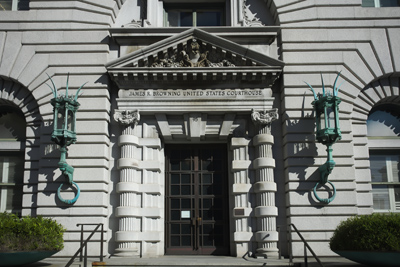Convicted murderer who presented evidence of his lawyer's racist views wins 9th Circuit appeal

The James R. Browning U.S. Courthouse in San Francisco. Image from Shutterstock.com
The en banc 9th U.S. Circuit Court of Appeals at San Francisco has granted relief to a convicted murderer who contended he was entitled to a new trial because of his appointed lawyer’s racist views.
The 9th Circuit said in a Jan. 15 order that California inmate Ezzard Ellis should be released from custody if the state does not retry him within a reasonable time period. The court said it was granting relief “in light of the state of California’s concession” that Ellis was entitled to habeas relief.
The state had changed its position after a 9th Circuit panel ruled against Ellis in June 2018, saying it was bound by a previous decision in another case involving Ames.
Three judges who concurred in the en banc order said the majority should have explained its decision. Judge Jacqueline Nguyen wrote the concurrence.
“Ezzard Ellis’s lawyer, Donald Ames, was a virulent racist who believed in the inferiority of racial minorities,” Nguyen wrote. “Worse, he allowed his repugnant views to infect his professional life—African American clients, court personnel and lawyers were ‘n——,’ and an Asian American judge was a ‘f—ing J–’ who should remember Pearl Harbor. Ames was disloyal and entirely indifferent to the fate of his nonwhite clients, convinced that they were all stupid and deserved to be convicted. I agree with the majority that Ames failed to provide reasonably competent representation to Ellis, who is African American.”
Nguyen said it would have been impossible for Ames to provide fair representation given his views, and a presumption of prejudice to Ellis’ case was warranted.
Ames represented Ellis in the last four of his five trials for a fatal shooting outside a McDonald’s. The first two trials ended in mistrials because witnesses were unavailable. The third and fourth trials resulted in hung juries. Ellis was convicted in 1991.
Ames died in 1999. Ellis wasn’t aware of his lawyer’s views until a friend sent him a newspaper article in 2003 that recounted the testimony of Ames’ adult daughters about Ames’ frequent use of racial slurs. Ellis obtained declarations from the daughters and people working with Ames who said the lawyer had contempt for people of other races and ethnicities, especially black people.
A dissenter in the en banc case, Judge Consuelo Callahan, said Ames was “an offensive and abusive human being” and his “abhorrently racist statements” make this a difficult case. But Ellis had failed to show that Ames’ views affected his performance at trial, and Ellis was not entitled to habeas relief, Callahan said.
Hat tip to How Appealing, which linked to coverage and the opinion. The San Francisco Chronicle, Law360 and the Metropolitan News-Enterprise are among the publications with coverage.



